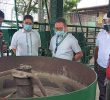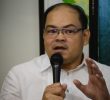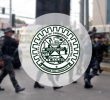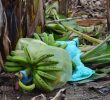“What we are trying to do is to encourage people to use what we have, to protect ourselves. Most of us hide what we are innovating. And by the time we make it public, someone had already patented it,” Dr. Warlito Vicente, chairperson of the Regional Health Research Development Consortium (RHRDC) warned.
By KENETTE JEAN I. MILLONDAGA
Davao Today
DAVAO CITY, Philippines — Healthcare professionals expressed concern on biopiracy, saying it is threatening Filipino scientists through patenting innovations without their knowledge.
Dr. Warlito Vicente, chairperson of the Regional Health Research Development Consortium (RHRDC), on Wednesday’s Club 888 at the Marco Polo Hotel, said biopiracy also poses threats against “sources of developing countries.”
He cited the case of nata de coco, a chewy, translucent, jelly-like food produced from coconut water which was originated in the Philippines, but had been patented by Japan.
“What we are trying to do is to encourage people to use what we have, to protect ourselves. Most of us hide what we are innovating. And by the time we make it public, someone had already patented it,” Vicente warned.
Vicente also cited the case of tawa-tawa (asthma weed), a herbal plant traditionally used by ordinary Filipinos in treating dengue, a mosquito-transmitted disease.
“Our knowledge on tawa-tawa is still superficial but with the use of nanotechnology one can copy its molecular structure. What is interesting is not so much on its production but the process of copying (its molecular structure) for commercial release. Once it is copied, we can no longer do anything about it,” Vicente said.
Even mobile phones have an application that, he said, can be considered a threat.
“There is a project in the United States, a phone application, where you can take photos of a plant and then send it to one of the centers which will give you its common name, scientific name, its family and its usage,” Vicente shared. “If they are interested they can research on those,” he added.
Vicente also emphasized the need for inventions in information and communication technology used in health care to be protected from being hijacked for commercial ends.
In fact, he said, there have already been inventions by Filipinos on these, such as electronic medical record, hospital waste management and hospital information system.
He encouraged putting these innovations out to public.
An innovation called electronic medical record done by Adrian Flores, a Dabawenyo, has already won first place in a competition launched by Silicon Valley this year, Wit Holganza, President of ICT Davao cited.
Innovations done by Filipinos in the field information and communication technology used in health care, Holganza announced, will be shown in the upcoming exhibit that their group ICT Davao Incorporated, together with RHRDC and Davao Software Industry Incorporated, will hold on November 9 to 11 at this city’s Abreeza Mall.
Dubbed Innovation Expo, the activity has the theme: “Enabling Innovation in Healthcare created in ICT Industries.” (Kenette Jean I. Millondaga/davaotoday.com)










